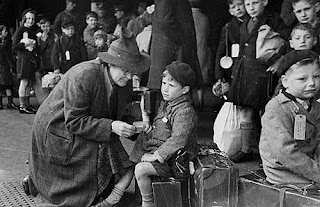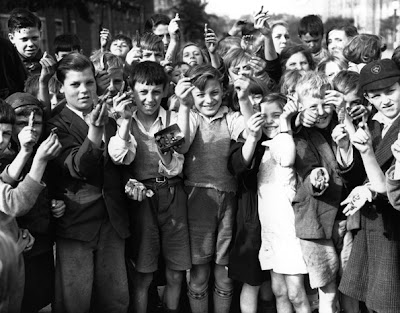Just a little time-out from the usual post. November 11 is Veteran's Day in the US and Remembrance Day in the UK. We've had a number of veterans in our family, on Momma and Poppa's sides of the family, so this is to honor them and their sacrifice.
Mom
"Remembrance Day (also known as Poppy Day or Armistice Day) is a memorial day observed in Commonwealth countries since the end of World War I to remember the members of their armed forces who have died in the line of duty. Remembrance Day is observed on 11 November, to recall the end of hostilities of World War I on that date in 1918. Hostilities formally ended "at the 11th hour of the 11th day of the 11th month," in accordance with the Armistice, signed by representatives of Germany and the Entente between 5:12 and 5:20 that morning. ("At the 11th hour" refers to the passing of the 11th hour, or 11:00 a.m.) World War I officially ended with the signing of the Treaty of Versailles on 28 June 1919.
The day was specifically dedicated by King George V on 7 November 1919, as a day of remembrance for members of the armed forces who were killed during World War I.
The red remembrance poppy has become a familiar emblem of Remembrance Day due to the poem 'In Flanders Fields'. These poppies bloomed across some of the worst battlefields of Flanders in World War I, their brilliant red colour an appropriate symbol for the blood spilled in the war." --from Wikipedia
The day was specifically dedicated by King George V on 7 November 1919, as a day of remembrance for members of the armed forces who were killed during World War I.
The red remembrance poppy has become a familiar emblem of Remembrance Day due to the poem 'In Flanders Fields'. These poppies bloomed across some of the worst battlefields of Flanders in World War I, their brilliant red colour an appropriate symbol for the blood spilled in the war." --from Wikipedia
 "Your great-grandfather, Joseph Shelton (Poppa's Dad), fought in WWI in 1917, where he was mustard-gased at Ypres, Belgium. He did not regain consciousness until back in England. He survived the war. He had a half-brother, John Henry Oscroft, who was killed in action in France in 1918. He is buried in France.
"Your great-grandfather, Joseph Shelton (Poppa's Dad), fought in WWI in 1917, where he was mustard-gased at Ypres, Belgium. He did not regain consciousness until back in England. He survived the war. He had a half-brother, John Henry Oscroft, who was killed in action in France in 1918. He is buried in France.Your great-great-grandfather, Charles Langford, who was drafted or enlisted at the age of 37, fought in WWI, survived the war, only to die of the Spanish flu in 1920. You have another great-great-grandfather, William Bradley, who fought in and survived the Crimean War (1853-1856).
Your great-uncles, Les Rossiter and Noel (Nobby) Inman, two of Momma's brother-in-laws, also served during WWII--Les in the Navy and Nobby in the Infantry in France. Both survived."
Mom






_strutt.jpg)










































